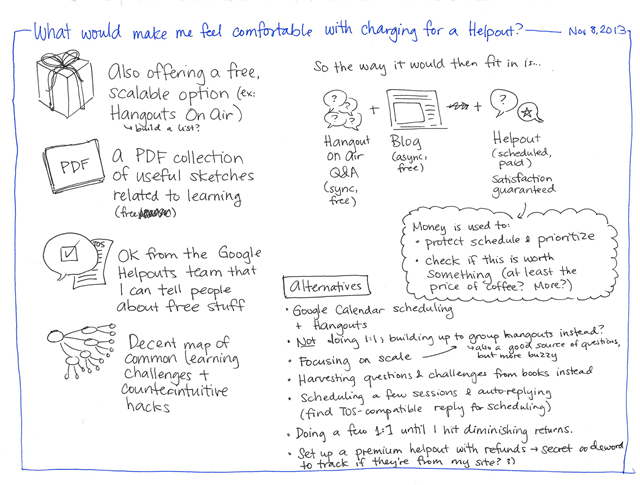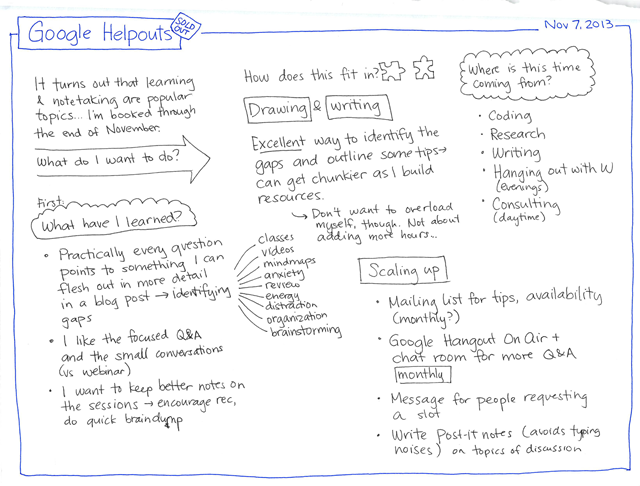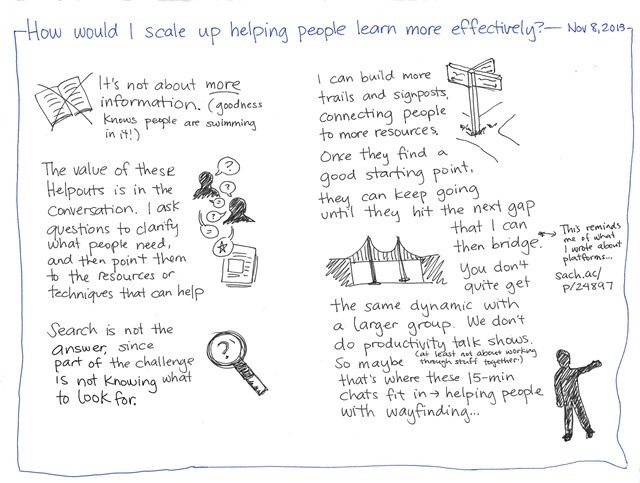Google Helpouts Update: People like it, so how do we scale this up?
Posted: - Modified: | connecting, teaching
It turns out that the newly-launched Google Helpouts platform is a great way to offer quick, focused help to people. 15 minutes is just enough time to ask a few questions to understand where people are coming from and share some tips and resources that can help them try out something new.
My note-taking Helpout is fully booked for the rest of the slots I opened in November. I’m keeping it to 15-minute slots for two hours a day or every other day so that I don’t get overwhelmed. My two other listings (Emacs geekery and introvert hacking) just went live. I added a few slots for those so that I can test the idea out. You can find all three at sach.ac/help… but they’re probably going to be fully booked by the time most people check it out.
Requests for more slots are piling up in my inbox, and I haven’t quite figured out what I’m going to do about them. I really really want to connect! People have all these fascinating questions, and I’ve gotten great conversations and drawing prompts out of these Google Helpouts. But I can’t let it take over my work or my life, so I need to find a better way to scale up that don’t involve just adding more hours.
One way to increase my impact without increasing my hours is to reduce the no-show rate. I think charging for a Helpout (even if I refund it on attendance) will drastically reduce my sign-up rate because people will need to set up a Google Wallet. I’m reluctant to introduce that kind of friction and effort when many of the people reaching out to me are blog readers (hi folks!) or students. I could be wrong about this assumption, so I should test it. Maybe charging will still result in sign-ups, in which case I may set the fee to a token amount (a cup of hot chocolate?) and inch it up until the slots reach equilibrium.
I want to make sure that I’m overdelivering value and that I can still encourage people to contact me for free. I’ve started a discussion in the Helpouts community to find out whether my idea of directing people to free resources (Hangout on Air? Blog and mailing list?) that are outside the Helpouts platform is compatible with Google’s Terms of Service. Google doesn’t want Helpout providers to channel people off the platform and into non-Google-hosted paid services… Would they mind if I nudged people towards free resources if I’m out of scheduled slots? We’ll see.
If I go this way, I also want a significant non-Google-Helpouts-marketplace way of encouraging people to sign up. That’s because most people browsing it will probably focus on the free offers (I would too!), and I want to make sure that people who really want to talk to me can still find me. I could update the page about what I can help people with so that it lists different topics and options in a visually engaging way.
Anyway, assuming that charging fills the time 100% with people who show up prepared to ask questions and pick my brain, then that effectively doubles my impact. It’s still about 1:1 interaction, though, and it’s still going to be limited by hours. Another way for me to scale up the help I can provide is to collect the answers together. For example, here are some sketches that grew out of people’s questions over the past week:
- 2013-11-08 How to deal with distractions
- 2013-11-08 Note-taking tips for meeting minutes #notetaking #meeting #learning #tip
- 2013-11-08 How to feel great about your daily to-do list #productivity
- 2013-11-08 Structure your notes for easy review #notetaking #organization #learning #tip
- 2013-11-08 Manage your energy when learning a lot in one day #learning #tip
- 2013-11-06 Make the most of lecture classes #learning #tip
- 2013-11-06 Helping students with study skills #helpouts #learning
- 2013-11-08 How to cheat when animating sketches #drawing #animation
If my goal for doing these Helpouts is to collect interesting questions that I can use to share what I’m learning and fill in the navigational gaps, then it’s in my interest to ask questions beforehand, share some quick resources, and cancel Helpouts if people aren’t responsive or if those resources answer the question so that other people can take the slot. (Be firm, Sacha!) The Helpouts interface doesn’t make it easy to keep track of the age of messages, but maybe using Google Mail with Boomerang will do the trick. Most likely, people who are engaged will then have follow-up questions, so we can fill in the next gap along the trail.
People don’t need more information. They need to figure out where to start. For me, the value I provide in the Helpout is in the back-and-forth of a quick conversation that clarifies what people need. That way, I can either point them to the right resources or give them some tips in case there are no such resources handy. (And then I can build those!) It’s a little difficult to do with a group session, although maybe if I get better at Q&A, I might be able to pull that off.
So maybe what I need to do is:
- Update the help page on my site and add different help options to it.
- Set up a mailing list for Hangout On Air, new Helpout availability, and new resources for different topics.
- Schedule a Hangout On Air experimental Q&A.
- Test conversion through my own page. Keep the session free.
- Package free resources.
- Be firmer about session preparation. Maybe give guidelines: three questions?
- Switch to a token fee with a cancellation policy, especially if I can update the listing or autorespond with include alternatives when fully booked.
Any suggestions?



11 comments
Jason John Wells
2013-11-14T15:33:32ZScale Google Helpout? For people differently-abled people , notetaking and organization are not just hacks but serious quality of life concerns and I am grateful for your help. You produce great content that could help many more but you may want to consider your /first principles/, scaling and the potential for conflicing interests between Helpout Terms of Service and silos.
People like RMS and the GitHub founders have changed the world by starting with their philosphy.
1:1 obvously does not scale but even recordings of HelpOuts and sharing sketchnotes is still only one-to-many, broadcasting. What about a P2P approach with open source?
Toastmasters helped me come out of my shell and what if you could use that type of model in a virtual learning environment like Moodle? http://docs.moodle.org/22/e.... Within a group of peers people can build habits, and help others on a structured learning path.
One alternative for a weekly class HelpOut session could be http://bigbluebutton.org/
Why not use the algorithmic process to train people to train people to help with introversion, Emacs and notetaking? I and I would imagine many more would be happy to help build such a tool.
sachac
2013-11-18T16:45:06ZHmmm, I hadn't thought about notetaking in that way, but I can see your point. =) I think it's tremendously useful even for a normal-ish brain like mine, which is like a sieve when it comes to things I haven't written down - thoughts just flow away! I assume most people's brains are more like this than like steel traps, and it's just that people think they can get by without taking notes, like people think they can get by with little sleep. ;)
How about we try a monthly Q&A / peer-help-in-the-chat-room sort of thing (http://sach.ac/learn), and we see how that goes from there? I don't think my VPS lets me have the kind of bandwidth BigBlueButton wants, but maybe better solutions will emerge as we explore.
Jason John Wells
2013-11-19T04:47:09ZSure.
I think note-taking is like GTD when David Allen says the people who really need it most are not the ones who are usually interested right away. It's usually higher performers trying to improve their game.
David Snowden (thought leader who used to head a KM group at IBM) says that programming and mathematics
departments have a higher degree of autism and dyslexics end up in marketing departments because they do well with novelty. A lot of ADHD people end up in entrepreneurship and arts as well.
Probably not the right venue to rant but these labels of ability are kind of catch-all boxes made from checklists and some just have styles of learning and thinking that don't fit the batch processing of traditional education.
Poor school performance and later socio-economic statistics could be improved if people learned how to learn earlier.
Before I found GTD I used to get pretty discouraged with the sieve. Allen is a mediator and really gets how brains work and the mind like water metaphor appeals to my buddhist background.
Allen is also a mind mapper and talks about the benefits of distributed cognition and Tony Buzan has some novel (not 100% scientific marketing claims but...) stuff to say about it to.
Note-taking is and organization are the scaffolding I need to be able to work on those higher Horizons of Focus.
I'm on-board the value of note-taking but I still haven't passed the, "I can't draw" barrier.
Thus, my desire for Sketchnotes 101.
BigBlueButton and a full Moodle setup doesn't gel with minimum viable product at this point. Maybe a org-mode file in a GitHub repo for the purpose of thinking about the algorithmic process of sketchnoting? Do you think methods like Tim Ferris' "Rapid Learning" could be applied to outline Sketchnoting?
sachac
2013-11-19T15:02:57ZSpeaking of getting started with sketchnotes - want to try How to Get Started with Visual Note-taking and then tell me where you're getting stuck? Forget about not being able to draw. =)
Jason John Wells
2013-11-20T14:00:26ZThanks.
Jason John Wells
2013-11-28T17:54:56ZTo follow-up on the structured learning path for sketchnotes, I found http://beta.braindoodles.net/ Perhaps a bit to simple for you Sacha but you might want to keep it in mind for people who don't know where to start with drawing and for kids.
My five year son old likes it and combined with some of your stick men it's amazing to see his progress. Also, everything is relative and compared to a five year old there's little chance of thinking you can't draw :)
sachac
2013-11-29T00:44:08ZThis is amazing! Thanks for sharing that. Here's another your son might like: http://www.sketchofrenzy.com/
Mindey
2013-11-15T20:34:35ZTo scale-up hangouts, you would essentially have to automate yourself. That's what I was thinking about, too. However, it is not an easy task -- you can't duplicate the interactivity of a hangout without duplicating the intelligence of your self. Anything less is not really the scaling-up. The essential properties are gone! Hangouts don't scale! You-tube videos do. You can just record all hangouts, and put the videos to a site with paid registration. Well, that's what many would buy from you, if you appeared to have useful videos. However, you should make the fee small enough that it would not look mean, and also send part of the money to the participants of the hangouts. It's quite easy to make monthly subscriptions, using PayPal recurrent payments. It is quite easy to create a site with that kind of registration, either using Drupal or WordPress. A working example: http://singularityhub.com/ -- they have paid-membership, with 5$/monthly fee. The members who pay 5$/month can view privileged videos ( http://singularityhub.com/v... ). One thing to keep in mind: these videos are going to be inaccessible to some people who do not have access to that payment method, or have not enough money.
sachac
2013-11-18T16:41:03ZI'm strongly for sharing information as widely as possible (choosing openness and scale) instead of restricting things to membership, so I'm going to keep exploring pay-what-you-want options.
I've been paying attention to the kinds of questions I ask and the resources I share in a Helpout and when people ask. As I understand more about my thinking processes, I'll be able to write better guides (getting inspiration from Twenty Questions, perhaps?) that can recommend good places to start so that people don't get overwhelmed. =) Maybe that's one way to scale!
Randy Milanovic
2013-12-07T16:11:54ZYou are right. interactivity (live) adds significant value.
sachac
2013-12-08T10:21:20ZGood for me too - I get to learn from people's questions. =)